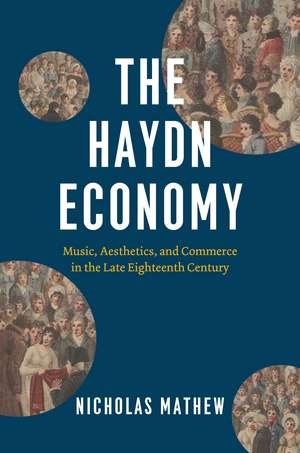The Haydn Economy: Music, Aesthetics, and Commerce in the Late Eighteenth Century: New Material Histories of Music
Autor Nicholas Mathewen Limba Engleză Hardback – 30 aug 2022
Preț: 302.12 lei
Nou
Puncte Express: 453
Preț estimativ în valută:
57.81€ • 60.51$ • 48.12£
57.81€ • 60.51$ • 48.12£
Carte indisponibilă temporar
Doresc să fiu notificat când acest titlu va fi disponibil:
Se trimite...
Preluare comenzi: 021 569.72.76
Specificații
ISBN-13: 9780226819846
ISBN-10: 0226819841
Pagini: 256
Ilustrații: 49 halftones
Dimensiuni: 152 x 229 x 23 mm
Greutate: 0.51 kg
Ediția:First Edition
Editura: University of Chicago Press
Colecția University of Chicago Press
Seria New Material Histories of Music
ISBN-10: 0226819841
Pagini: 256
Ilustrații: 49 halftones
Dimensiuni: 152 x 229 x 23 mm
Greutate: 0.51 kg
Ediția:First Edition
Editura: University of Chicago Press
Colecția University of Chicago Press
Seria New Material Histories of Music
Notă biografică
Nicholas Mathew is professor of music and the Richard and Rhoda Goldman Distinguished Professor in the Humanities at the University of California, Berkeley. He is the author of Political Beethoven. With James Q. Davies, he is the series coeditor of the New Material Histories of Music series at the University of Chicago Press.
Cuprins
Introduction
Ringing Coins
Haydn and the City
Media, Motion, Connection
Commerce, Interest, Objects, Work, Value
1 Commerce
Importation of Haydn
Warehouse Aesthetics
Mobility and Credit
A Resonant World
New Addresses
Music before the Cliché
2 Interest
Taking Note(s)
Psychic Investments
Disinterest and Boredom
Making Musical Interest
The Fate of Interest
3 Objects
Little Boxes
Pursuit of Objects
Objects, Animals, People
Haydn’s Musical Objects
Surface Fantasies
4 Work
Chapel Master, Chapel Servant
Liberty, Work, Stress
The Work of Comedy
Work, Property, Works
The Creation Concept
The Industry Concept
Working Concepts
Epilogue: Value (1808)
Of Time and Fashion
Romantic Infrastructures
Haydn Recalled
Gold Is a Mighty Thing
Acknowledgments
Notes
Works Cited
Index
Ringing Coins
Haydn and the City
Media, Motion, Connection
Commerce, Interest, Objects, Work, Value
1 Commerce
Importation of Haydn
Warehouse Aesthetics
Mobility and Credit
A Resonant World
New Addresses
Music before the Cliché
2 Interest
Taking Note(s)
Psychic Investments
Disinterest and Boredom
Making Musical Interest
The Fate of Interest
3 Objects
Little Boxes
Pursuit of Objects
Objects, Animals, People
Haydn’s Musical Objects
Surface Fantasies
4 Work
Chapel Master, Chapel Servant
Liberty, Work, Stress
The Work of Comedy
Work, Property, Works
The Creation Concept
The Industry Concept
Working Concepts
Epilogue: Value (1808)
Of Time and Fashion
Romantic Infrastructures
Haydn Recalled
Gold Is a Mighty Thing
Acknowledgments
Notes
Works Cited
Index
Recenzii
“Tracing the conceptual overlap of aesthetics and economics as they developed in the eighteenth century, Mathew not only offers a startlingly original vision of Haydn and his relationship to ‘commerce,’ but also makes a major contribution to current debates about the nature and mission of music scholarship. Not just boundlessly informative, but compulsively readable and entertaining.”
“In this dazzling and timely book, Mathew reveals not only how Haydn’s music functioned in the late-Enlightenment economic landscape, but also how musical culture helped shape modern market society. As the field of music studies today ponders the future of canons and canonical works, The Haydn Economy shows us that we are far from done with Haydn and the eighteenth century—indeed, perhaps we are only just beginning to understand how this period’s deep-seated legacies continue to reverberate today.”
“The Haydn Economy seems to signal a new era in musicology. This is a book about Haydn that is certain to draw in, rather than repel, those of us who think of colonialism and slavery before the symphony when we hear the words ‘eighteenth-century Europe.’ An intellectual tour de force.”
“Combining deft musical analysis and broad learning across disciplines, this book charts Haydn’s long career less as an evolution of style than as a series of orientations toward the newly mobilized cultural economies of Vienna and London. In Mathew’s account, Haydn achieved a major body of work that, unlike the Romantic differentiations of value that soon would follow him, managed to avoid setting aesthetic norms and market forces at odds. The Haydn Economy is a must-read for anyone interested in ‘the most abundantly mediated musician of his age’ or in the music and culture of the world in which he moved.”
"The Haydn Economy is, as its subtitle promises, a rich and tightly woven tapestry of musical, aesthetic, and economic concerns, filled with quirky details that are the engaging hallmarks of New Historicism."
"The essential momentousness of Haydn’s retirement from Esterházy court life and transition to a final period marked by musical triumph, financial independence, and some degree of artistic autonomy, has perhaps hindered rather than sustained investigations into the peculiar contexts in which these events unfolded. Nicholas Mathew offers a fresh and timely study of this area in The Haydn Economy, an illuminating, wide-ranging monograph on the late eighteenth-century cultural economy in which Haydn participated. The book makes not only a major contribution to studies of the composer and his achievements in their Viennese and English milieus but also a compelling case for reevaluating our understanding of the complex of craft, aesthetics, and enterprise at work in their age more widely."
"Mathew’s pathbreaking study traces the many ways aesthetics and economics developed in tandem during the second half of the eighteenth century. Unpacked in minute detail is Haydn’s deep connectivity to commerce throughout his long and prolific career, enabling Mathew to move the discipline far beyond genre-based studies or traditional understandings of the composer’s dealings with the marketplace. . . . Mathew is to be applauded for bringing musicology—and Haydn—into this dynamic new age."










